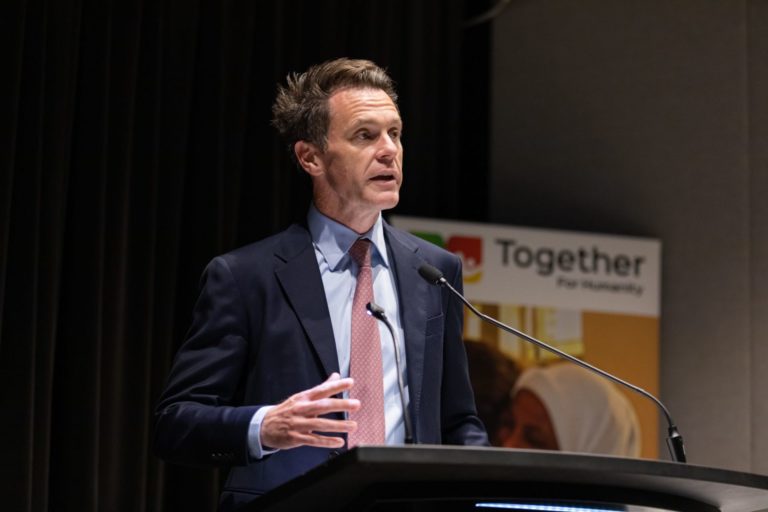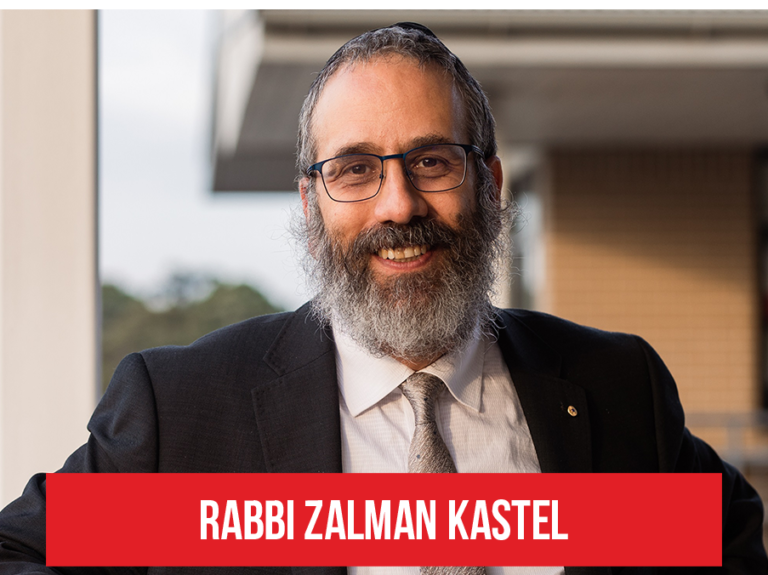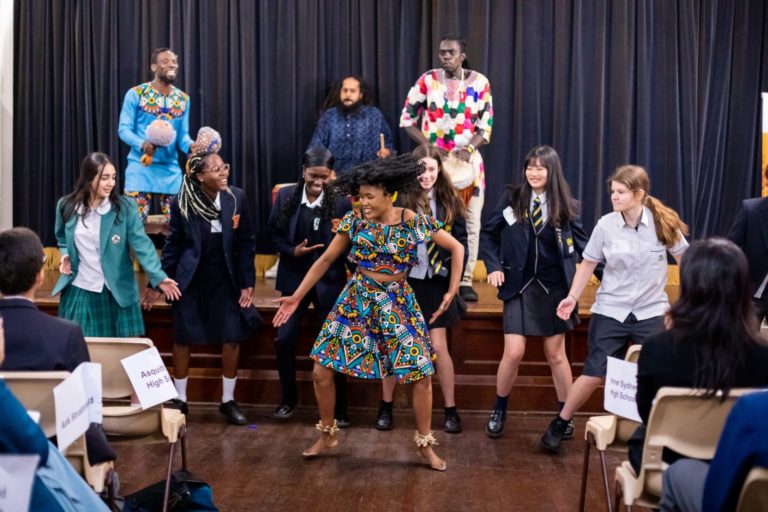The findings from the Australian Cohesion Index 2023, a report from the Scanlon Foundation Research Institute, revealed just one in two adults (52 per cent) said they had a great sense of belonging in Australia – a drop of 27 per cent since 2007. While this proportion declined across all age groups, the dip was more than four times larger for younger adults, with just 34 per cent of 18–24-year-olds and 31 per cent of 25-34-year-olds reporting a great sense of belonging.
To help turn these feelings around, exploring ways for young Australians to combat prejudice and play a role in fostering an inclusive, cohesive country was the key focus when high school students from across NSW gathered in Sydney on 19 October for the 2023 Together For Humanity (TFH) NSW Youth Summit, held at the Parliament of NSW and St Stephen’s Uniting Church.
More than 100 students from 16 schools from across the state – from metropolitan Sydney to regional Broken Hill – voiced their ideas around the summit’s Diversity and Connection theme, making presentations on real-world issues experienced and suggesting solutions to inspire unity.
Read more: Together For Humanity Victorian Youth Summit aims to nurture ‘positive change-makers’
Racism and prejudice are a reality that young people encounter in our schools and communities. According to a recent Speak Out Against Racism, survey, 60 per cent of Australian students have observed fellow students being discriminated against by their peers due to their race, while 31 per cent have reported facing such discrimination themselves and 21 per cent have faced racial discrimination in broader society.
Students at the summit engaged in open communication with peers and explored opportunities for collaboration, with students workshopping proposals on how to make Australia a country free from prejudice, which were presented to politicians and community leaders. NSW Premier Chris Minns also made his own address to the gathering.

“By empowering young people and giving them the tools to challenge prejudice, we can help them to shape a more tolerant society,” says Together For Humanity Dean and Founder Rabbi Zalman Kastel AM. “The Youth Summit offers a chance for their views to be heard and for them to listen to the insights of their peers, challenging their own perceptions and helping them come to understand others’ unique situations and cultural differences. They will leave equipped with the knowledge and confidence to be advocates for inclusion within their schools and communities.”

Schools involved represent NSW’s Independent, Catholic and Government sectors, with Catholic, Islamic, Jewish and other faiths represented.
Uniting Muslim and Jewish voices
“Today I heard from both Muslim and Jewish students about their concerns about religious prejudice,” Rabbi Kastel says. “In the case of Muslim students, they are concerned about portrayal of their faith and the impact on young people. From Jewish students, we heard broader concerns about low-level understanding of different faiths. People are scared of religion as if it’s some sort of scary monster. It’s just what people do. It’s a part of culture.”
To become a country that genuinely celebrates diversity, Rabbi Kastel highlighted the need to be accepting of diversity in all its forms – from gender diversity to cultural and religious diversity, too.

“Understanding people’s beliefs, practices and cultures is not so scary and the students really want people to understand them and to understand each other,” he says.
Government schools at the TFH Youth Summit included:
The Forest High School, Birrong Girls High School, Inner Sydney High School, Pendle Hill High School, Broken Hill High School, Willyama High School (Broken Hill), Asquith Girls High School, St George Girls High School and Barrenjoey High School.
“It is important for our students to be involved in initiatives like the Together For Humanity NSW Youth Summit because it offers them a unique opportunity for personal growth where they can be active participants in building an inclusive future. That’s one reason why we are willing to travel so far to take part,” said Nicole Gurney, Student Representative Council Coordinator at Broken Hill High School.
Independent schools at the TFH Youth Summit included:
Bellfield College, Oxley College (Burradoo), Australian International Academy Sydney Strathfield Campus, Emanuel School and Knox Grammar School.
“Having our students engage in conversations about the realities of prejudice and discrimination and allowing them to work with students from other schools to come up with solutions, will give them valuable insights and skills that will serve them well throughout their lives,” said Mr Sam Ashton, Gifted & Talented Coordinator at Bellfield College.
Catholic schools attending were:
St Luke’s Catholic College and Delany College.
“The Together For Humanity NSW Youth Summit goes beyond traditional classroom learning and enables students to become responsible global citizens. Such initiatives encourage respect for others and can inspire positive change,” said Mr Bruce Carr, Assistant Principal at Delaney College.
Nurturing future leaders
Motivated by its mission to inspire and equip Australia’s future leaders to be agents for positive change and advocates for inclusion in their communities, TFH has been running Youth Summits since 2016.
With a goal to help young people deepen their understanding of diverse cultures, faiths and experiences, TFH works directly with schools to run free well-being and educational programs, courses, curriculum-linked workshops and educator professional development opportunities. The programs help students to work cohesively and embrace differences, while equipping school administrators with the knowledge and skills to make classrooms more inclusive.
“If we want to see change, change comes from within,” says Rabbi Kastel. “We have a lot of student leaders today who will be moulding their schools’ cultures based on what they’re discussing today. So having that opportunity to articulate their concerns, their suggestions on how to improve it, and learn from each other position them to improve and create school cultures that are inclusive.”
Dr Phil Lambert is TFH CEO and says it’s “important for young people to come together and have their voice heard”.
“Heard by their own peers, but also adults – including politicians and key leaders in the community. It’s important because it’s not only their voice, it’s their sense of agency,” he says. “They want a different Australia. They want a different world. We need to listen to them because their ideas are not only fresh, they’re also innovative and creative. Their ideas need to be acted on.”








